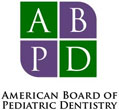FAQ’s
- Before your child cuts his or her first tooth, clean the gums after each feeding with a soft, damp washcloth
- As soon as the first tooth erupts, you can begin using a toothbrush. Be sure to use a brush with soft bristles and a small head.
- You can purchase toothbrushes specifically designed for infants at your local department store.
- Regular tooth brushing will remove plaque and bacteria that can lead to decay. Use the toothbrush twice a day at least once before bed.
Early Childhood Caries is formerly known as baby bottle tooth decay or nursing caries. The condition occurs when the child is overexposed to sugary liquids. Severe early childhood caries usually occurs when the child is routinely put to bed with a bottle containing juice, soda or milk. It can also occur from allowing toddlers to “graze” with a sipper cup. Early childhood caries often destroys teeth and leads to the need for major dental treatment. The condition can potentially damage your child’s adult teeth if left untreated.
By following the guidelines listed below, you can prevent baby bottle tooth decay from occurring.
- Help your child start learning to drink from a regular cup by their first birthday.
- If your child “grazes,” only allow water in any bottles or sipper cups used.
- Clean your baby’s gums with a fresh gauze pad after each feeding.
- Begin brushing as soon as you see the first tooth.
- Never give your child a pacifier coated in sugar or dipped in honey.
- The bacteria that causes caries is transmissible, avoid sharing drinks or kissing your baby close to the mouth, especially if you have not seen your dentist for regular appointments.
A pediatric dentist takes two additional years of specialized training that focuses on children. This gives pediatric dentists the skills they need to build strong and trusting relationships with children from infants to young adults and an understanding of their unique dental health needs.
Although many children suck their thumbs or fingers as infants, most grow out of the habit by the age of three without causing permanent damage. Pacifiers should be discontinued by the age of two. A pacifier habit is easier to discontinue than a thumb-sucking habit. If your pediatric dentist notices damage occurring to the teeth or oral structures, make every effort to help your child stop sucking his or her thumb or fingers by the age of three or sooner. If your child continues sucking after adult teeth have come in, we may recommend a retainer appliance to help your child break the habit.
Brushing your teeth effectively removes plaque and food particles from tooth surfaces, but can’t properly clean the hard-to-reach areas between them. This leaves these areas highly susceptible to decay and periodontal disease (gum disease). Daily flossing corrects this problem by cleaning between the teeth and under the gum line, disrupting the build up of plaque colonies and helping to prevent damage to the gums, teeth, and bone.
Plaque is an invisible film of living bacteria combined with food debris and saliva. It produces the toxins that cause cavities and irritate the gums. When left in place, it hardens and turns into tartar (known as calculus) which further irritates and inflames the gums while slowly eating away at the dental bone structure, marking the beginning of periodontal disease.
How to floss properly:
- Take 12-16 inches (30-40cm) of dental floss and wrap it around your middle fingers, leaving about 2 inches (5cm) of floss free between them.
- Using the thumbs and forefingers to guide the floss, gently insert it between the teeth and slide it back and forth in a sawing motion.
- Curve the floss into a “C” shape around each tooth and under the gum line. Gently move the floss up and down, cleaning the side of each tooth.
- For those who might struggle with this process, we recommend floss holders.
f your child is suffering from a toothache, rinse the affected area with warm water and use floss to remove any food from the surrounding gum areas. If necessary, give your child Children’s Tylenol or Motrin according to package instructions to control the pain. Never place aspirin directly on teeth or gums. If the child’s face is swollen, call our office immediately, 201-880-8129. A swollen face indicates a serious infection requiring immediate attention. For after-hours emergencies, we can be reached at 201-880-8129
The single most important thing you can do as a parent to prepare your child for this first visit is to have a positive attitude. Children are remarkably adept at picking up attitudes from those around them and will tune in if you are nervous. If you make negative comments about dentists or dental visits in the child’s hearing, your child will anticipate a negative experience.
To help prepare your child for the visit, show your child a picture of the office and the dentist on the office’s website. Tell your child how important it is to have healthy teeth and that the dentist will help you in this goal. Consider a library visit to check out some children’s books on teeth, dentists and good dental care. If you wish, you can call us for suggestions. Remember that our pediatric dentist is specially trained in relieving the fears and anxieties of patients and that our staff is equally experienced at putting children at ease.
Baby teeth serve multiple functions. Several of these are listed below.
- Baby teeth help the child chew his or her food well and to eat a balanced diet. Children whose baby teeth are suffering from multiple cavities may become underweight from an inability to eat a healthy diet. Cavities can cause toothaches that prevent a child from chewing certain foods.
- Fillings are important to repair cavities in baby teeth and help protect the development of the adult teeth below. Cavities that are left unattended will eventually reach the core of the tooth and destroy the nerve. The nerve will become inflamed and will eventually die. The result is a dental abscess that often results in the loss of the tooth and can damage the developing adult tooth below. The most severe cases will require emergency hospitalization. To help prevent abscesses, cavities in baby teeth should be cared for promptly.
- To help protect a child’s self-esteem, it’s important to give them the gift of a beautiful smile. Missing teeth or teeth with spots can have a negative impact on a child’s outlook in life.
- Baby teeth serve as placeholders for permanent teeth. Children who lose teeth prematurely are at risk of having their adult teeth come in crooked or misplaced.
- General health in all people is influenced by the heath of the teeth and gums. Thus, it is very important to maintain a healthy oral structure in your child’s mouth.

 201-880-8130
201-880-8130


